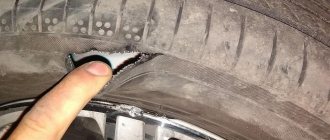What are the penalties and consequences for a traffic police officer and a motorist when giving a bribe?
This act is understood as remuneration of an official, which is of an illegal nature, for him to commit illegal actions or not to perform an action that is required by law.
When a traffic police officer stops the violator’s car, communication takes place between them. It is during this time that the bribe is given. The driver’s goal is to quickly resolve the problem and continue driving without completing the procedure, as required by law. The illegal act in this case is two-sided. It is committed both by a law enforcement representative and by the driver.
What awaits the motorist? And here the criminal law reports extremely sad consequences.
Art. 291 of the Criminal Code of the Russian Federation states the following:
- For giving a small bribe - from a fine of up to 500 thousand rubles to imprisonment for up to 2 years.
- For a dacha in a significant amount - from a fine of up to a million to imprisonment for 5 years.
- On a large scale – from a fine of no less than 1 and no more than 3 million to imprisonment from 7 to 12 years.
- On an especially large scale – a fine of at least 2 and a maximum of 4 million rubles or imprisonment from 8 to 15 years.
- If a bribe was given for knowingly illegal actions of an inspector - from a fine of up to one and a half million to imprisonment for up to 8 years.
As in the case of taking a bribe, imprisonment can be combined with a fine and deprivation of rights.
Info
The size of the bribe is calculated in the same way as in the case of receiving it.
Remember that proving the presence or absence of an offense is the responsibility of the road patrol officer, not yours. If the inspector demands money What to do if the traffic police asks for a bribe, ignoring all legal requirements, regulations and the turned on DVR? Is it worth following the lead and trying to resolve the conflict on the spot, without resorting to any instruments of influence on the careless patrol inspector? In no case.
Be aware of criminal liability for bribery or intermediary. Even if you actually violated traffic rules, it is better to pay a fine or temporarily lose your driver's license than to get a criminal record. Option No. 1: call the hotline You can get rid of unfounded claims from the inspector by simply calling the State Traffic Inspectorate hotline. Its number is usually indicated directly on the body of the traffic police patrol car.
- 3.1 Option No. 1: call the hotline
Unfortunately, road patrol inspectors do not always act in the interests of citizens and the legislation of the Russian Federation. From time to time, for some of them, their own pocket becomes more important. Unreasonable stops begin, strange complaints against drivers, attempts to persuade them to break the law, etc.
The same punishment awaits the inspector who openly extorted a bribe.
- For a particularly large amount (over 1 million) – from a fine of 3 million to imprisonment from 8 to 15 years.
- If the bribe was taken for obviously illegal actions (for example, during an accident, the inspector indicated a completely different person as the culprit in the documents, although he knew the truth) - a fine from half a million to 2 million, or imprisonment from 3 to 8 years.
It must be remembered that imprisonment and a fine do not exclude each other: the jailed inspector may well pay an additional fine. In addition, he may be additionally prohibited from holding certain positions for different periods, depending on the severity of the crime.
After all, an invitation to go into the patrol car of a traffic police inspector or into the premises of a post cannot always be considered as extortion.
So, how can you document extortion of a bribe by a traffic police officer? In general, it’s a good idea for a car owner to always have a voice recorder or camera with him and record all meetings with traffic police officers. If you are clearly and brazenly extorted a bribe, then an audio or video recording will be a compelling argument to take away your license and not pay either a bribe or a fine, because
the fact that the illegal actions of the inspector are recorded on audio or video media will frighten the latter and it will be easier for him not to contact you, even if you have violated traffic rules. Back in 2003, Boris Gryzlov (then Minister of Internal Affairs) called on all car owners to photograph or film cases of extortion and send them to the ministry.
It’s one thing when a stop by an inspector is associated with real offenses. But there are situations when a traffic inspector begins to ask various questions about the presence of certain items that are required to be in the car, or, even worse, impute non-existent offenses.
And then the driver understands that all these actions are connected with the desire to receive some kind of material reward from him. The natural desire in such a situation is to somehow rein in an inspector who is not behaving properly.
We invite you to read: What is needed for dismissal due to disability
Important
In order to substantiate a charge of extorting a bribe, evidence is required. Otherwise, the driver himself may be accused of providing false information.
To collect the necessary evidence, you can use a video recorder, voice recorder or some other technical means.
Only the punishment for giving a bribe is not as severe as for extorting a bribe. It is also important that the person who gave the bribe is exempt from criminal liability if there was extortion of a bribe by an official or if the person voluntarily informed the body that has the right to initiate a criminal case about giving a bribe.
It should be noted that for extorting a bribe, in contrast to receiving a bribe, a much more serious punishment is provided - imprisonment for a term of seven to twelve years with a fine of up to one million rubles or in the amount of wages or other income of the convicted person for a period of up to five years or without it. It is quite difficult to prove the fact of extortion, because...
It is very difficult to establish a clear line between extortion and simple hints.
Attention
The traffic police inspector, being on duty, is one of them.
- A bribe is given for actions that are within the authority of such a person. If, for example, your car broke down, a kind inspector allowed you to call a tow truck from his personal phone, and you gave him money for it as a token of gratitude - this cannot be considered a bribe: the duties of the traffic police do not include the provision of communication services, so the money will be considered as a gift.
As in the case of taking a bribe, imprisonment can be combined with a fine and deprivation of rights. The size of the bribe is calculated in the same way as in the case of receiving it.
Without a protocol, the employee has the right to conduct only an external inspection of the car.
- What to do if the traffic police demands a bribe and claims that you are under the influence of drugs or alcohol or have grossly violated traffic rules? Say that you are willing to undergo a medical examination and pay the legal fine. Ask them to write you a receipt and draw up a report on the administrative violation.
- Behave as correctly as possible, do not show aggression or excitement. Do not react to obvious provocations and do not try to justify yourself to the inspector.
Even if you do not give a bribe yourself, but act only as an intermediary, this is a crime under Art. 291.1 of the Criminal Code of the Russian Federation. The punishment here also depends on the size of the bribe and ranges from a fine of at least 700 thousand rubles to imprisonment for 12 years.
After all, an invitation to go into the patrol car of a traffic police inspector or into the premises of a post cannot always be considered as extortion. So, how can you document extortion of a bribe by a traffic police officer? In general, it’s a good idea for a car owner to always have a voice recorder or camera with him and record all meetings with traffic police officers.
If you are clearly and brazenly extorted a bribe, then an audio or video recording will be a compelling argument to take away your license and not pay either a bribe or a fine, because the fact that the illegal actions of the inspector are recorded on audio or video media will frighten the latter and it will be easier for him not to contact you, even if you have violated traffic rules.
Attention
Giving a bribe to an official, a foreign official or an official of a public international organization personally or through an intermediary for committing previously illegal actions (inaction) - is punishable by a fine in the amount of thirty to sixty times the amount of the bribe or imprisonment for a term of up to eight years with a fine in the amount of thirty times bribe amounts. What to do if a traffic cop asks for a bribe? Question: What to do if a traffic cop asks for a bribe? Lawyer's answer: Do not give a bribe and write down a request-demand... My name is Elvira.
I gave a bribe of 3,000 rubles to the traffic cops and the court decided that the fine was 90,000 rubles. I don’t work anywhere, three Question: Hello! My name is Elvira. I gave a bribe of 3,000 rubles to traffic cops and the court decided that the fine was 90,000 rubles. I don’t work anywhere, I have three small children, a low-income family.
Question: Hello! please tell me what the consequences are if you bribed a traffic cop 20,000 and wanted to get your license back, mitigating circumstances are a confession and 2 young children? Lawyer's Answer: Hello Maria! Responsibility is provided for in Article 291 of the Criminal Code of the Russian Federation. Giving a bribe (as amended by the Federal Law of 04.05.
2011 N 97-FZ) 1. Giving a bribe to an official, a foreign official or an official of a public international organization personally or through an intermediary is punishable by a fine in the amount of fifteen to thirty times the amount of the bribe, or forced labor for up to 3 years, or imprisonment for up to 2 years with a fine of ten times the amount of the bribe.
We suggest you read: If your business trip falls on a weekend or holiday
Important
Where should I go? We stopped the car, took it, looked at the license, the insurance was all in order. Question: The traffic cop extorted a bribe of 10,000 rubles. Where should I go? Stopped the car, took it, looked at the license, the insurance was all in order, put me in my car and asked me to blow into the alcohol meter, the meter showed red but I didn’t drink, I offered to call a laboratory, they offered to pay 10,000 rubles. What to do, but they returned my license. Lawyer's answer: the VPM will be helped by an appeal to the Investigative Committee, the regional security department, and the department of its security.
Free legal assistance
Giving a bribe to an official, a foreign official or an official of a public international organization personally or through an intermediary is punishable by a fine in the amount of fifteen to thirty times the amount of the bribe, or forced labor for a term of up to 3 years, or imprisonment for a term of up to 2 years. years with a fine of ten times the amount of the bribe.
Thus, even for a 100-ruble bribe, a traffic police officer can go to jail for up to 3 years. I wonder why this doesn't stop some police officers? 2.
Further in the text of this article I will call them “small bribes.”
In practice, bribes to police officers do not very often exceed 25,000 rubles, however, we will further consider all possible options. Responsibility of a traffic police officer for receiving a bribe Responsibility for receiving a bribe is described in detail in Article 290 of the Criminal Code of the Russian Federation: 1.
Where to file a complaint against traffic police officers who extorted a bribe?
Be sure to ask who is accepting your application for extortion, and also receive a copy of your application with a mark indicating its registration with a law enforcement agency or a notification coupon indicating information about the employee who accepted the message and his signature, registration number, name, address and telephone number of the law enforcement agency, date of receipt of the message.
In addition, you have the right to find out from the law enforcement agency entrusted with the execution of your application about the nature of the measures being taken and to demand that you be received by the head of the relevant department to receive more complete information on issues affecting your rights and legitimate interests.
Question: Hello, I violated traffic rules in another city, I allegedly violated the traffic cops, they scammed me for a bribe, they drew up a protocol at the end, they said that they would send the case to my place of residence, today I received a letter that the case will be considered in another city, what to do? Lawyer's answer: Hello! Write a petition for consideration of the case at your place of residence.
Send by registered mail to the court and expect to be summoned to court at your place of residence Good afternoon, on the highway I gave a bribe of 1000 rubles to a traffic cop Question: Good afternoon, on the highway I gave a bribe of 1000 rubles to a traffic cop, as it turned out it was a setup, I wrote an explanatory note on the same day and confession that I am waiting for Article 291 Part 3, positive characteristics have not been involved before Lawyer’s Answer: Hello!
In this case, the court may impose a suspended sentence. The law interprets the concept of bribery quite broadly. A bribe can be considered any property that has at least some material value, it can be not only a physical object, a thing, but also a service, some kind of benefit, a bribe can be in the form of a “random gain” or a loan on preferential terms.
- As soon as you receive a corresponding signal or hint from the ransomware, concentrate, be attentive, and under no circumstances try to show any initiative or interest.
- Speak carefully and tersely, but politely.
Content
Thus, both the attempt to take and the receipt of a bribe are equally illegal and threaten both parties with criminal liability. At the same time, there are cases when liability does not arise for one or the other party. These include the following situations.
If the driver gave a bribe, but then he himself admitted to committing the crime. Moreover, he repented of this and is ready to help in investigative activities.
If a traffic cop incited to give a bribe, and the violator was able to film this fact using modern technical means, this will become a real evidence base when accusing the corrupt official.
Inspectors try not to take money into their hands. The usual option is to play a scene during which funds are “lost” in the traffic police car or directly in that part of it that the DVR camera does not perceive.
Liability for bribing a traffic police officer
Well, since an impressive number of drivers prefer to “resolve the issue on the spot” rather than bring the matter to court, this article will be of interest to them. Let's get started.
The Criminal Code provides for the possibility for a driver who gives a bribe to avoid liability for it. (The traffic police officer accepting the bribe does not have this opportunity.)
It is quite natural that as the size of the bribe increases, so does the size of the punishment. I note that the punishment for the driver is significantly less than the punishment for a traffic police officer for the same crime.
However, for a bribe of 100 rubles you can end up behind bars for 2 years. I don’t think that such a prospect will please anyone.
- significant amount of bribe - more than 25,000 rubles;
- large bribe amount - more than 150,000 rubles;
- especially large bribe amount - more than 1,000,000 rubles.
Extortion of bribes on the roads. how to fight?
If you find yourself in a situation where a bribe is extorted from you, you can use a special “helpline”, which is available in all traffic police departments (numbers are available at stationary posts and at traffic police patrols).
Attention
You can also report the fact of extorting a bribe in a written statement to the management of the regional traffic police department or the department where the dishonest employee works.
Important
The driver of a car against whom unlawful actions are committed has the right to demand that higher authorities be called to the scene of the conflict and file a written complaint.
And in this case, he will face punishment under Art. 290 of the Criminal Code of the Russian Federation:
- For a small amount (up to 25 thousand rubles) – from a fine of up to 1 million rubles to imprisonment of up to 3 years.
- For a significant amount (over 25 thousand) - from a fine of up to one and a half million rubles to imprisonment for up to 6 years.
- For a large amount (from 150 thousand) – from a fine of up to 4 million to imprisonment for a term of 7 to 12 years.
Bribe 500 rubles liability
Responsibility for giving and accepting a bribe comes within the framework of the Criminal Code of the Russian Federation and threatens with serious consequences, including imprisonment for up to 15 years. Explicit and implicit bribes One of the classifications of bribes is related to the form in which they are given:
After receiving money or other material assets (services), the bribe-taker undertakes to:
exceeding 25 thousand rubles.
- Bribes on a large scale, i.e. more than 150 thousand rubles.
- Bribes on an especially large scale, i.e. exceeding 1 million rubles.
Even if you work honestly, do not allow abuses and respect the law, in one unpleasant moment people in uniform may come into your office and handcuff you. What to do if you are mistakenly accused of taking a bribe, for example, by planting money in documents or an office? 1. Definition of a bribe in the Criminal Code The law considers a bribe to be the transfer of money, valuables, or the provision of services by one person (called the bribe-giver) to another in exchange for the commission of any actions by the receiving party (the bribe-taker). For a bribe to be classified as a crime, it must be given by an ordinary citizen to a person holding a state or municipal position.
The Criminal Code of the Russian Federation provides for liability for receiving and giving a bribe to an official. We will consider what punishment a person faces for this act in this article. The concept of giving a bribe to an official By giving a bribe is understood an action that involves the illegal delivery of material assets to an official.
Depending on the amount that is given to the official (or the value of the thing that is transferred to him), the following bribe sizes are distinguished:
- An obvious bribe. With this option, after an agreement between persons, a citizen holding a certain position receives (or should receive) money in a certain amount or other material value (thing, real estate, vehicle, etc.);
- Veiled bribe.
Due to the fact that in order to conceal the very process of illegally resolving their issues, people sometimes try to provide assistance to an official in the performance of his duties in a somewhat veiled form so that they do not look like a bribe, the legislation provides for the following classification.
Where to complain if they demand a bribe?
So, do traffic cops have the right to ask for a bribe on the spot? Question: A young man was stopped by traffic cops. They asked him to breathe into a tube; he was hungover. and of course the device showed it. So, do traffic cops have the right to ask for a bribe on the spot? Lawyer's answer: no one has the right to ask for a bribe anywhere. It is a sin.
The traffic cops should book him for driving a vehicle while intoxicated! they have no right to extract funds, but if the fact of the demand is not recorded on a voice recorder or video camera, you cannot prove anything. For bribing a traffic cop, you face 8 years or a fine of up to 500 thousand rubles. Question: For bribing a traffic cop, you face 8 years or a fine of up to 500 thousand rubles.
We suggest you read: Can my husband sue my child if I left him?
For billions of losses to the state, Mr. Vasilyeva is guaranteed PR and a comfortable life until the end of her days. Where is the justice?? Lawyer's answer: in the kingdom of heaven, only a traffic cop extorted a bribe of 10,000 rubles.
How to avoid provocations from the traffic police? Often, the inspector begins to persuade the driver to give a bribe after a preliminary inspection of the vehicle and verification of documents.
If you behave correctly at this stage, you are unlikely to have to think later about what to do if the traffic police extorts money: the State Traffic Inspectorate officer will most likely refuse further pressure as soon as he notices that you are well versed in the legal nuances of the country’s road legislation .
Rules for communicating with the inspector
- Having stopped the car at the request of the traffic police, turn off the engine, lock the doors and open the window 10 - 15 cm so that the necessary documents can be passed through it. It is not necessary to get out of the car to clarify the reasons for the stop.
- Turn on the DVR or video camera and point it towards the driver's door. If you have a voice recorder, turn it on too.
Content
Unfortunately, road patrol inspectors do not always act in the interests of citizens and the legislation of the Russian Federation. From time to time, for some of them, their own pocket becomes more important.
Unreasonable stops begin, strange complaints against drivers, attempts to persuade them to break the law, etc. How to behave in this situation? What to do if the traffic police demands money, threatening to deprive you of your license or even confiscate your vehicle? Let's try to figure it out.
Bribes and the Criminal Code of the Russian Federation Receiving and giving a bribe in Russia are criminal offenses.
Is 500 rubles a bribe?
How is a bribe of 500 rubles or an attempt to give a bribe charged?
Example 1: Citizen A., when visiting a doctor, asked to expedite his admission as a patient, supporting his request with a 1000-ruble bill. This act will be classified under Part.
A friend at work, the police officers came to check and said that anything up to 5,000 rubles is not punishable (gratitude). But, please note, not only the transfer of cash is considered, but also a wire transfer to an official’s card or account. The Criminal Code of the Russian Federation has Article 291, which provides for punishment for those persons who dare to give to an official.
Evidence of a crime
The presence of physical evidence is of great importance in the trial process. A person is held criminally liable if there is irrefutable evidence that a crime has been committed. It should be noted that the inspector’s report on the bribe offer will not be enough, but this document can also play an important role.
Car owners should remember that all road patrol vehicles are equipped with audio and video surveillance systems, which are aimed at monitoring road traffic, its participants and the actions of the employees themselves.
https://www.youtube.com/watch{q}v=UJD9SJGoX_o
The purpose of installing such equipment is to encourage traffic police officers to properly fulfill their job descriptions and establish control over their official actions.
Recently, such a phenomenon as preventive measures implemented under the auspices of the Internal Security Directorate of the Ministry of Internal Affairs of Russia has become widespread. Identification and suppression of illegal actions is carried out against a wide range of persons.
If the inspector stops the transfer of money or immediately seizes the funds with further reporting to the security service, there can be no talk of bribery. In this situation, there is a crime committed by a citizen, but we should not forget about possible provocation on the part of the inspectors themselves.
If during the trial it is proven that the transfer of money was the result of extortion or incitement on the part of officials, there is every chance that the accused will be released from criminal liability.
We invite you to familiarize yourself with: The procedure for restructuring the debt of individuals
Attention!
- Due to frequent changes in legislation, information sometimes becomes outdated faster than we can update it on the website.
- All cases are very individual and depend on many factors. Basic information does not guarantee a solution to your specific problems.
That's why FREE expert consultants work for you around the clock!
- via the form (below), or via online chat
- Call the hotline:
APPLICATIONS AND CALLS ARE ACCEPTED 24/7 and 7 days a week.
Punishment for this offense occurs only when the person has received a bribe. It is considered a decent amount of money that was transferred without any reason. If the parties can prove the transaction, then it will be impossible to accuse them of bribery.
A traffic police inspector who has been offered a bribe has the right to issue a report against the negligent driver. But he must have documentary evidence confirming this fact, namely:
- video, photo or audio recording;
- testimony of witnesses who saw the offense committed.
On the other hand, the driver may try to accuse the traffic cop of bribery, although in this case the latter behaves extremely carefully and rarely mentions a specific amount of money.
Definition
A bribe is the illegal transfer of funds to a government official while performing his duties. Most often, this phenomenon occurs on the roads. By giving a bribe to a traffic police officer, the driver hopes that the violation of traffic rules will not be recorded by the inspector. Responsibility for such a crime is determined taking into account the category to which it can be classified.
We invite you to read: Arbitration court ruling on accepting a statement of claim
Bribes are given for various reasons, for example, for violating overtaking rules. If we divide it into types, we can distinguish the following:
- in a small amount - this is when the amount of money transferred to an official does not exceed 25 thousand rubles;
- in a significant amount - more than 25 thousand;
- on a large scale - we are talking about amounts exceeding 150 thousand rubles;
- especially large sizes start from a million rubles.
The legislation describes subjective and objective signs of bribery. They are listed in Art. 30 and 290 of the Criminal Code.
Classification
Criminal legislation provides for several groups of bribes.
The determining criterion is the size of the transferred (offered) amount:
- a significant amount - over 25,000 rubles;
- large bribe - from 150,000 rubles;
- especially large - from a million rubles.
The concept of giving a bribe to a traffic police officer follows from the general definition of bribery given by criminal law. A bribe is the transfer of material assets to an official for the commission of certain actions on his part (or inaction) in the interests of the bribe giver.
Classification
Provoking a bribe to a traffic cop
If the culprit is “caught in the act” and is charged with a crime under Articles 290 or 291, it is necessary to act as follows.
When accused of transferring a bribe:
- Find a good lawyer to defend yourself against false accusations.
- provide maximum assistance to the investigation in the hope of reducing the punishment.
- prove the fact of extortion (if it took place) using video recordings, audio, witness statements, photographs.
Please note that charges of transferring a bribe can only be brought by law enforcement officers, taking into account their existing competencies.
If you are accused of receiving money or extorting it, you must:
- Hire a lawyer who is a professional in the field of corruption crimes.
- prove the fact of provocation of a bribe (if the cash was planted without the knowledge of the official).
- use the entire evidence base - testimony of colleagues, camera recordings, documents, videos and other data.
In the absence of direct evidence, you need to appeal the results of the investigation to a judicial authority, because the fact that money has been identified does not mean anything.
If a person actually broke the law and took money, it is better to admit guilt and use the experience of a lawyer to reduce the punishment. Difficult financial situation, family problems, etc. may be mitigating circumstances.
Ways to combat incitement
Signs of incitement by police officers are:
- Deliberate slowness in drawing up the protocol;
- A colorful and detailed description of the maximum possible punishment for a committed traffic violation;
- Agreed distribution of roles between traffic police officers: one stops the car and simulates drawing up a protocol, and the second hints to the driver about the possibility of resolving the issue by transferring money.
It is almost impossible to determine the purpose of inciting a bribe, obtaining a monetary reward or punishing the bribe givers; the driver himself must decide whether to give or not to give a bribe. It also happens that you can run into a raid by OBEP officers working under the guise of traffic police inspectors or together with them, recording the giving of a bribe using special equipment.
Often, police officers use gestures and facial expressions in communication to convey information about the amount of a bribe, for example, showing several fingers, where each finger represents 100 rubles. Such actions, as well as the deliberately increased volume of the voice, indicate that the police are using audio equipment to record the dialogue.
To be on the safe side, the driver can carry a voice recorder with him, which must be turned on discreetly before talking with the police inspector. The recording will be an argument in favor of the driver in case of litigation. However, to do this, it must contain a direct question from the driver (would you like me to pay on the spot{q}), addressed to the inspector, with a confirming answer to the question asked.
In this case, the judge may exempt the driver from liability for passing a bribe in accordance with the note to Article 291 of the Criminal Code, which allows this if there is extortion of a bribe. It should be borne in mind that, unlike police officers, an ordinary citizen does not require special permission from officials to use a voice recorder as a recording device. But to avoid accusations of falsifying and processing the recording, you need to use an analog device, not a digital one.
We suggest you read: Receiving insurance payments to police officers
If, after being forced to give a bribe, the driver wants to punish the traffic police inspector, then he can write a statement about this to any police department indicating his bib number and the amount of the bribe given, not forgetting to mention that the inspector extorted a bribe. This action is assessed as a voluntary confession, which, based on the same article of the Criminal Code of the Russian Federation, exempts the applicant from liability for giving a bribe.
Car owners often become “victims” of traffic police inspectors, who extort a bribe through their actions. They take steps to force the person to resolve the issue in a “different” way. In practice, the following methods are used to persuade a person to give money:
- slowness in completing the protocol
- light threats
- an indication of the possible consequences of the violation (the problem is greatly exaggerated)
If the driver is in a hurry or is afraid of future consequences, he will inevitably offer to “resolve the issue” without drawing up a protocol. The “good cop/bad cop” tactic is often used. In this case, one traffic police officer plays the role of a strict peace officer who complies with the law, and the second recommends not to take risks and give a certain amount to “resolve the issue.”
To protect yourself from incitement, you must:
- Take out your phone and record what is happening. If you have a video camera, you can use it. In the future, the resulting video may be useful in a judicial body as evidence of innocence. If the inspector demands to turn off the recording, you need to refer to the Law “On the Police”. Paragraph 5 states that the driver has the right to film the actions of a traffic police officer.
- Do not go to the inspector to communicate in the car. In this case, there are no witnesses, so it is easier for the traffic police officer to put pressure on the driver and demand money. According to current legislation, a car owner must get into a police car in two cases - detention or arrest in compliance with the law.
- Write down the information of the traffic police officer who demanded the bribe (full name, badge number and other information).
- Contact the personal safety department by dialing the helpline number.
In most cases, it is enough to take out the camera to discourage the inspector from “squeezing out” money.











